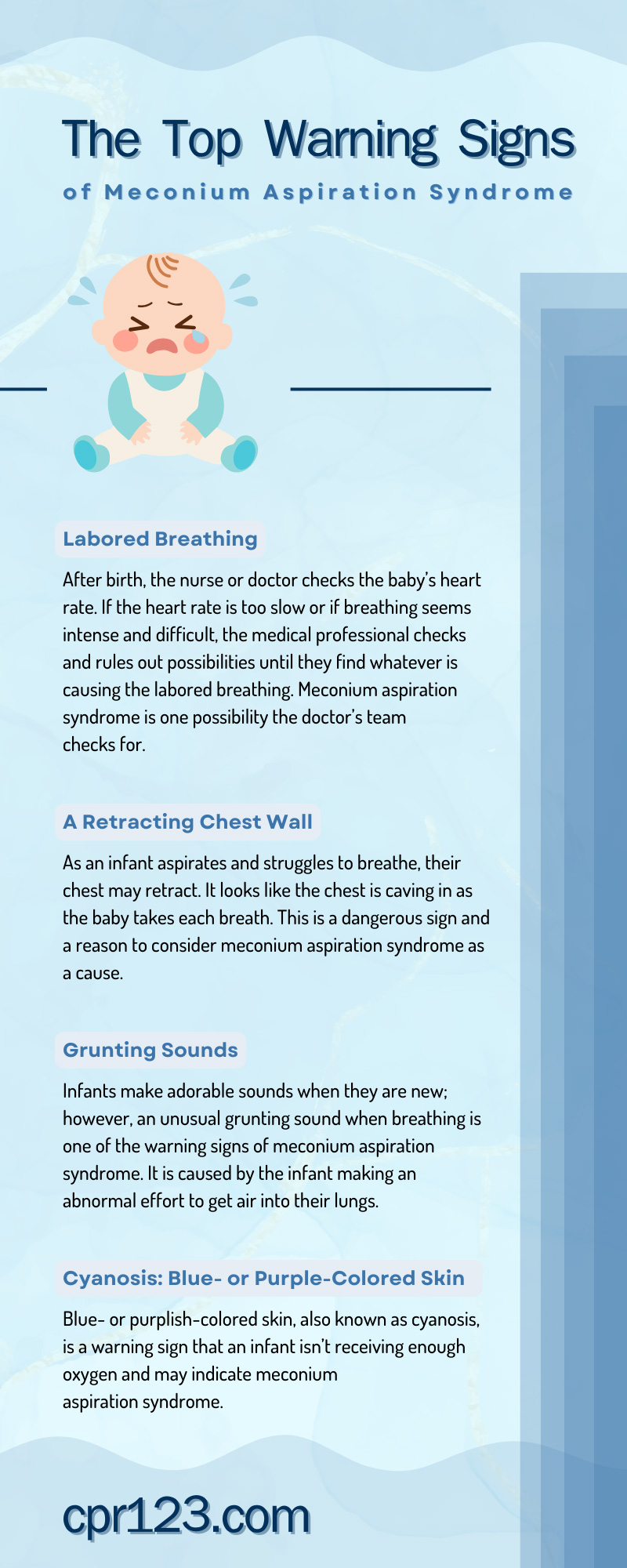The first stool a newborn baby passes is called meconium. It’s dark and sticky, and many describe it as looking like tar. Typically, the meconium passes shortly after birth, around a few hours or a few days after. However, elimination sometimes occurs while the baby is still in the womb, and the meconium gets into their lungs. When this happens, there is a risk of meconium aspiration syndrome (MAS). Thankfully, there are warning signs of meconium aspiration syndrome. Follow along as we discuss what those are.
Warning Signs of MAS
As with any illness or danger, understanding the warning signs helps prevent the situation from going too far or causing worrisome health issues. Your doctor will likely discuss the possibility of meconium aspiration during your pregnancy and let you know if they feel your baby may be at risk for it.
Remember that if meconium appears before birth, it doesn’t always mean that aspiration is imminent. However, it does mean the doctor will take immediate precautions to prevent it and any necessary steps to save the baby from illness or death if they are aspirating. The following is a list of possible warning signs of meconium aspiration syndrome.
Labored Breathing
After birth, the nurse or doctor checks the baby’s heart rate. If the heart rate is too slow or if breathing seems intense and difficult, the medical professional checks and rules out possibilities until they find whatever is causing the labored breathing. Meconium aspiration syndrome is one possibility the doctor’s team checks for.
A Retracting Chest Wall
As an infant aspirates and struggles to breathe, their chest may retract. It looks like the chest is caving in as the baby takes each breath. This is a dangerous sign and a reason to consider meconium aspiration syndrome as a cause.
Grunting Sounds
Infants make adorable sounds when they are new; however, an unusual grunting sound when breathing is one of the warning signs of meconium aspiration syndrome. It is caused by the infant making an abnormal effort to get air into their lungs.
Cyanosis: Blue- or Purple-Colored Skin
Blue- or purplish-colored skin, also known as cyanosis, is a warning sign that an infant isn’t receiving enough oxygen and may indicate meconium aspiration syndrome.
Low Apgar Score
Shortly after a baby is born, within one to five minutes, the attending medical staff administer an Apgar test. It’s a simple, quick test that tells the doctor if the baby is doing well or poorly after birth. When administering the test, the staff checks the following:
- Muscle tone
- Reflexes
- Breathing
- Color of the skin
- Heart rate
Each category is rated, with zero being the worst and two being the best. For example, if breathing is labored, the score is one; if there is no breathing, the score is zero; and if breathing is perfect, the score is two. When a low-scoring Apgar test occurs, the doctor will then check for possible causes of the low numbers. Poor breathing, unhealthy skin color, and a low heart rate are all suspects for meconium aspiration syndrome.
Limp Body
An all-around limp body is a sign that a baby may not be breathing well and could be aspirating.
Green Amniotic Fluid
Before seeing any symptoms, the doctor may notice a green tint to the amniotic fluid that comes out during labor. The green tint may be a warning sign that the infant has passed their first stool before leaving the womb, meaning there is a risk of meconium aspiration syndrome.
What Causes a Baby To Pass Meconium Early?
There are many risks during pregnancy and delivery. Sometimes, no answers exist for certain issues that arise, or it remains a mystery as to why they happen. We can say the same for MAS. Still, we can link some pregnancy concerns to meconium aspiration syndrome.
An Overdue Baby
There is no need to panic if your baby is overdue. Overdue babies are delivered daily with no health issues. However, some risks increase, including MAS, when an infant stays in the womb longer than necessary.
A Tough Delivery
No delivery is easy; however, some are tougher than others. A long, drawn-out delivery is a risk for MAS. If delivery is going on for quite some time, the baby is more likely to pass meconium before birth.
Health Problems During Pregnancy
Certain health problems occur during pregnancy and are then gone once the baby is delivered. The most common are diabetes and high blood pressure. These both put the baby at a higher risk for meconium aspiration syndrome because of the stress they impose.
Smoking During Pregnancy
Smoking during pregnancy is dangerous for mother and baby. According to the CDC, it may lead to SIDS (sudden infant death syndrome), birth defects, and premature birth. There is also some correlation between smoking and MAS.
The Baby Not Being Fully Grown
Sometimes, a baby doesn’t grow well in the womb, causing stress during delivery and possibly leading to gasping and inhaling meconium-tainted fluid.
Treating Meconium Aspiration Syndrome
A baby being born with MAS is frightening. Thankfully, your doctor can provide treatments. If a baby isn’t breathing, the doctor will immediately deliver neonatal resuscitation. For other MAS symptoms, the infant goes to the NICU (neonatal intensive care unit) for special care and close observation. The following are some possible treatments for meconium aspiration syndrome.
Surfactant
Unborn infants naturally produce surfactant while still in the womb, at around 26 weeks. Surfactant opens the airways and prepares the baby to breathe on their own after delivery. One way to treat MAS is to give the struggling newborn more surfactant.
ECMO Machine
An ECMO (extracorporeal membrane oxygenation) machine strengthens the infant and helps them breathe by pumping blood from the body through an artificial lung. The device delivers oxygen to the blood and removes carbon dioxide. As the blood returns to the body, it’s oxygenated and free of carbon dioxide.
Nitric Oxide
Administering nitric oxide to the struggling infant with MAS improves the delivery of oxygen and opens blood vessels.
Nothing is more frightening than hearing something might be wrong with your newborn baby. We can find comfort in knowing that doctors and nurses are trained in neonatal resuscitation and respond quickly to save lives if necessary.
At CPR123, we are proud to offer AHA NRP certification training for healthcare providers. Contact us with all your certification questions and to find the next course you need.








